NOTE: As part of a series of sermons on Mental Health and the Church, I was invited to share my experiences with spiritual darkness. Here is the text of my reflection shared on November 5, 2017 at West Philadelphia Fellowship
A Privileged Life
I want to begin by acknowledging that compared to many people I have had a very fortunate life. I have lived with undeserved and unmerited privilege. Like anyone, I have had my share of frustrations, fears, stresses, disappointments, and sadness, but it has all occurred in the context of privilege, and I need to acknowledge that at the start.
What I want to talk about was my experience with spiritual darkness or what the sixteenth-century monk, St. John of the Cross called “the dark night of the soul.” Most people assume that spiritual darkness has to so with depression. While depression, anger, sadness and all sorts of emotions were part of the experience, it was more about feeling lost in the world, feeling powerless, and not knowing what the future would hold. And it was about a feeling God’s silence and God’s absence.
It All Started with the Jesuits
In the summer of 2015, I had an opportunity to go on a seven-day silent retreat at the Jesuit Center in Wernersville, PA about 8 miles west of Reading. A brain researcher at Jefferson Hospital was doing research on the effect of spirituality on the brain and offered to pay anyone’s way to this retreat if they would allow him to scan their brain before and after going on the retreat. I saw it as an opportunity to do something I otherwise might never do, and so on a lark, I signed up for his experiment, and got to go on this retreat for free.
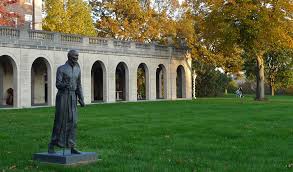 Pretty quickly I confirmed that the monastic life was not for me, and after two days I seriously considered cutting out altogether. But I persisted. Essentially, each day consisted of meeting for an hour with a spiritual director who would give me my assignment for the day. Basically, we were following the pattern of the Ignatian spiritual exercises. He would give me three or four passages of scripture and a theme for the day like Praise, or Confession or Discerning the Spirit. I was to read the passage attempting to place myself in the passage in some way, reflect and journal my thoughts and feelings, and pray about whatever came up. And I might go thru those passages tow to three times on the same day. The time with the spiritual advisor was the only time we were allowed to talk; the rest of the day we were silent.
Pretty quickly I confirmed that the monastic life was not for me, and after two days I seriously considered cutting out altogether. But I persisted. Essentially, each day consisted of meeting for an hour with a spiritual director who would give me my assignment for the day. Basically, we were following the pattern of the Ignatian spiritual exercises. He would give me three or four passages of scripture and a theme for the day like Praise, or Confession or Discerning the Spirit. I was to read the passage attempting to place myself in the passage in some way, reflect and journal my thoughts and feelings, and pray about whatever came up. And I might go thru those passages tow to three times on the same day. The time with the spiritual advisor was the only time we were allowed to talk; the rest of the day we were silent.
For a long time, I have known that I am not very good at hearing God in silence. When I have any sense of God, it is usually in a crowd. and so being silent before a silent God was little more than I thought could bear at the time, but I got thru the experience. And thought that was it.
The Darkness Descends
That was late June-early July. In late August of that summer, I began to feel myself slipping into a place I later realized was spiritual darkness. I have a practice of first thing in the morning having a time of journaling, reading Scripture, usually reading some book on spiritually-related topic and prayer. I began having these vivid dreams that I wrote about in my journal of people and events in my past, I had not thought about in decades. I had a dream where I was caught in a cavernous hole that I could not get out of. I had another dream where I was driving people around and I had something in my eye so I was having trouble seeing, and I didn’t know where I was going. I would wake up in the middle of the night with powerful feelings of sadness, or loneliness or anxiety or fear. Those feelings had no connection with had gone on the day before, they so showed up in the middle of nowhere. And while it didn’t happen every night, this pattern went on for months.
That was the summer POWER had its Fast for Family Values where people camped out in front of the Capitol Building in Harrisburg to try and convince the state legislators to increase funding for public education and they seemed to have cared less. Three to four years we had been at it with no success.
Meanwhile, things work were in turmoil. We went through a downsizing and our department of five was reduced to two people in a matter of a few months. Decisions were being made by that had a direct negative effect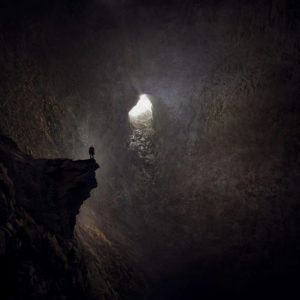 on our ability to find and recruit new students, so our numbers dropped, our revenue plummeted. Much of what I had worked for and poured myself into was being dismantled, and despite angry memos and fierce confrontation, I was powerless to change any of it.
on our ability to find and recruit new students, so our numbers dropped, our revenue plummeted. Much of what I had worked for and poured myself into was being dismantled, and despite angry memos and fierce confrontation, I was powerless to change any of it.
So outwardly things were falling apart & going nowhere, and inwardly was lost. And God was silent and absent.
The Dark Night of the Soul
St. John of the Cross was a Spanish monk in the 16th century who was a close friend of Teresa of Avila. Both were members of the Carmelite monastic order. Against the wishes of the leaders of the order, Teresa attempted to start a new convent, and John helped her. In December 2, 1577, some men sent by the Carmelite leaders broke into John’s room, tied him up and threw him a solitary prison, until he would renounce his work with Teresa (which he refused to do). In a solitary cell with only a tiny slit of light, John composed his work on the Dark Night of the Soul, first memorizing the words and then dictating those words to a kind jailer who wrote them down. In vivid language, his basic message was that God is not something to be grasped or controlled, but rather encountered. This idea of the darkness is not so much about something evil or sinister, but rather being totally at the mercy of God.
Many spiritual writers have attempted to express John’s original insights into contemporary terms. Thomas Moore says that the dark night of the soul is “a period of sadness, trial, loss, frustration or failure that is so disturbing and long-lasting” it makes you question the very meaning of life. Gerald May, a Christian psychiatrist adds that the biggest lesson of the dark night is “I am not as in control of life as I like to be.” The dark night is characterized by confusion and powerlessness. It is not something you choose, it just comes over you. This was what I was experiencing – confusion over what was happening, and feeling powerless and frustrated to change anything, and all the God-language I had learned through the years was worthless and meaningless.
The Psalmist in Darkness
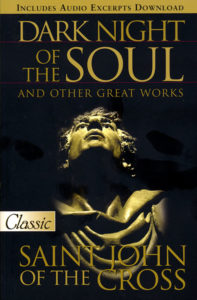 I am guessing that is what the writer of Psalm 88 felt. For the most part, the book of Psalms is a collection of prayers. For that reason, I tend to think that Psalms tell us more about the people praying to God than they tell us about God. About every sort of emotion can be found in the Psalms, and the language can be flowery and uplifting, but it also can be raw and scathing. That is what we have in Psalm 88.
I am guessing that is what the writer of Psalm 88 felt. For the most part, the book of Psalms is a collection of prayers. For that reason, I tend to think that Psalms tell us more about the people praying to God than they tell us about God. About every sort of emotion can be found in the Psalms, and the language can be flowery and uplifting, but it also can be raw and scathing. That is what we have in Psalm 88.
Psalm 88 is written by a man identified as Heman the Ezrahite who feels abandoned by God. He uses language like
“My soul is full of trouble and my life draws near the grave …”
“I am counted among those who go down to the pit …”
“You (God) have put me in the pit, in the darkest depths …”
“I am confined and cannot escape …
He feels abandoned, rejected, even condemned by God. He is totally at a loss, alone and ends with these words: “You have taken my companions and loved ones from me and darkness is my closest friend.”
What I learned
I suspect for the Psalmist that phrase – “darkness is my closest friend” – is meant as a final rebuke of God, an exclamation of disgust at God’s abandonment. However, for me as the months went by I came to see these words as an affirmation – Barbra Brown Taylor helped me see that in fact, darkness was my friend. Instead of resisting the darkness, I came to accept it and to a degree even embrace it. For over a year things in my spirit did not lighten up, and things at work continued to deteriorate, and then in Spring of 2016 just as I thought I might be emerging out of the darkness, my father who had been relatively stable took a quick and steep decline and died. The darkness returned, but this time there was a strange relief in it. I came to accept that yes, I am powerless and that’s okay.
There are all sorts of insights I gained thru this time, I don’t have time to share them all. But let me focus on a few key things, and why I came to see the darkness, not as a curse but rather a friend.
First, I came to realize that all those dreams and middle of the night emotions, and all the frustrations and disappointment I was experiencing in my work, and the grief over my father’s death were an invitation to transformation. Like a caterpillar going into a cocoon, I was being invited into a liminal space of darkness to go thru a transition I had no control over. I only had the choice to resist where it was taking me or go along with it. I had no assurance of success, or relief from my struggles, but I was being invited to simply go thru whatever the process would produce. Thomas Moore writes that the dark night will not necessarily make you a happier person, but it will make you a better person. We are not promised a stress-free, problem-free life; but each challenge and frustration is an opportunity to grow.
Second, once I accepted my powerlessness, I was able to let go of anxiety and frustration ( at least some of it), and replace it with curiosity. All my life I have been a planner and a doer. I set goals and go after them. I still set goals, and I am still active but increasingly I am trying to hold those goals lightly and just take life as it comes and see what emerges. Barbara Brown Taylor helped me see my loss of control as a gift, kind of like riding a roller coaster where you go up and down and all around. It is frightening and exhilarating at the same time. Life becomes a sort of adventure where you are not sure what will turn up, so be curious.
Third, like seeds planted in the dark soil or a baby in a mother’s womb, the deep changes in our lives often must start in the darkness, in the places of our not knowing and not having control. The dark night of the soul for me became an invitation to be open and receptive to whatever new thing may happen in my life. I don’t know if who I am is evident to other people, but I feel more centered, more patient. I still get angry and frustrated, but inwardly I experience those things differently. I still have crazy dreams, but now I look them like Hmm- I wonder that one is trying to tell me.
Finally, I came to more deeply appreciate the value of community. We are a “community of faith” for a reason; we hold each other’s faith. Even if God seemed silent to me, he wasn’t to others in my church, at my work and in the activist groups of which I am a part. And so even though I was not sure about what God was up to there were others who carried me with their concern and their faith.
A Light in the Chapel
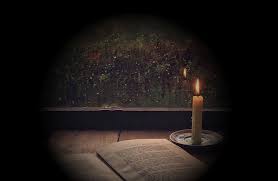 And God – God is still a mystery to me. I’d love to tell you that I have come through this with a deeper awareness of God’s Spirit in my life. I would like to tell you I no longer struggle with loneliness, anger, and sadness. I would love to tell you that things at work have seen a dramatic turnaround. I am not like one of those paralytics that Jesus healed who are now jumping around and praising God. I have no idea what God is up to. I trust he is at work at people like you all and organizations like POWER – if I see God at all, that is where.
And God – God is still a mystery to me. I’d love to tell you that I have come through this with a deeper awareness of God’s Spirit in my life. I would like to tell you I no longer struggle with loneliness, anger, and sadness. I would love to tell you that things at work have seen a dramatic turnaround. I am not like one of those paralytics that Jesus healed who are now jumping around and praising God. I have no idea what God is up to. I trust he is at work at people like you all and organizations like POWER – if I see God at all, that is where.
At the Jesuit Center there is a chapel, and at late at night, all the lights are off, except for a lighted candle hanging by a long chain for the high arched ceiling. About halfway thru my 7-day silent retreat, I started ending my days by going into the chapel and looking at that candle. It became my metaphor, my symbol of God. I think of it often still today, and I am thinking: Okay God, there you are, what are you going to do. No answer comes, so I go on my way.
As Jesus advises his disciples at the end of Matthew 6 – Don’t worry about tomorrow, just focus on today. That is what I do – one day at a time, often in the darkness, open, waiting, curious, and wondering.
Sources mentioned
- Thomas Moore *(2004). Dark Nights of the Soul: A Guide to Finding Your Way Through Life’s Ordeals. New York: Gotham Books
- Gerald May (2005) The Dark Night of the Soul: A Psychiatrist Explores the Connection Between Darkness and Spiritual Growth. New York: HarperCollins
- Barbara Brown Taylor, (2014). Learning to Walk in the Dark. New York: HarperCollins
Interested in Learning More. Check out the Urban Studies Program at Eastern University at this link

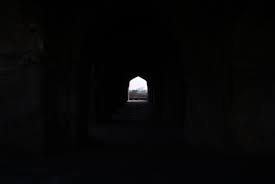
Thank you, Drick, for sharing an insightful and personal reflection. Like artists recognize early on, the spaces around an object in view reveal that objects true nature. It is in the often dark spaces of our experiences that God can be most present.
All the best,
Kevin
Such an encouraging post. I have a new perspective on “darkness.” Thank you for sharing